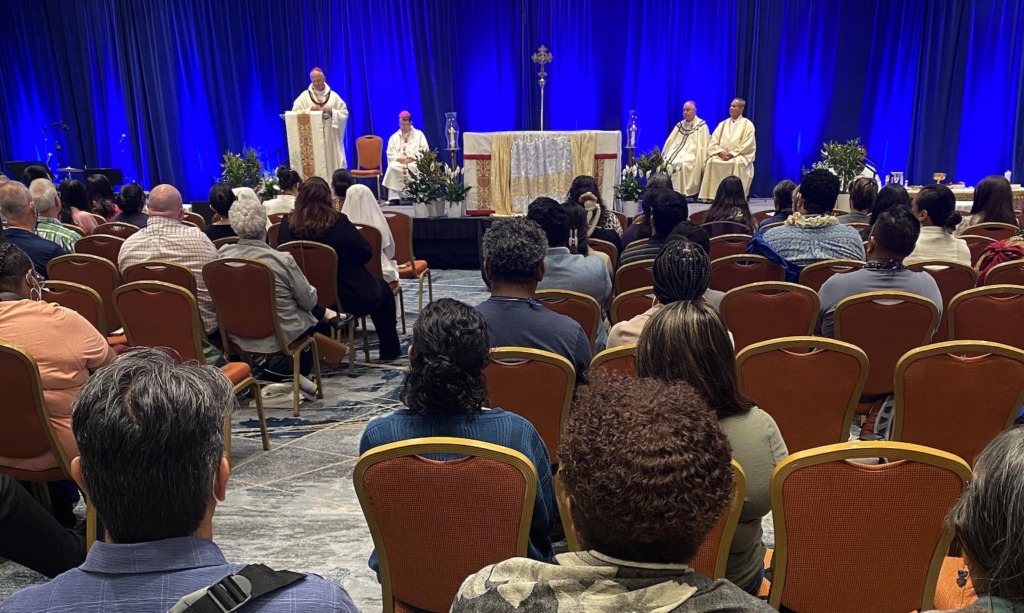The last day of a national Catholic gathering in Chicago for culturally diverse ministry leaders and young adults started with a prayer service that included African worship music and prayers in multiple languages, including some from Africa and the Middle East.
The energy of the participants gathered at the “Alive in Christ: Young, Diverse, Prophetic Voices Journeying Together” event was evident.
The conversations centered on the next steps in the multiyear process and how ministry leaders can bring their learning into their parishes, centers and organizations.
For many, like Semret Hailemariam, a member of the Ge’ez Rite Eritrean Catholic community, the journey has helped build bridges between her Catholic community and others.
“This entire process has been so humbling. We would have never had the opportunity to share about our rich liturgy, history and culture had it not been for the invitation,” said Hailemariam.
The culturally diverse groups represented were: Asian and Pacific Islander, Black and African American, European American, Hispanic and Latino, Native American and Alaska Natives, as well as migrants, refugees and travelers.
About 325 people participated in the national event, and about 150 dioceses were represented, in addition to Catholic national organizations, colleges and universities, campus ministries, and apostolic movements.
Group leaders shared the themes and suggestions that resonated in their small-group discussions and planning in the areas of historical memory and inclusion, diversity and giftedness, practicing accompaniment, and formation possibilities.
The suggestions and conclusions of the gathering will be compiled and offered as a resource to dioceses, schools, Catholic organizations and apostolic movements.
“Exclusion is painful. No one wants to be excluded from something, so we try to be inclusive to everyone and try to give everyone the opportunity to be involved,” said a participant from Detroit.
His group offered suggestions, including seeking opportunities to invite diversity into the parishes and training seminarians to work with culturally diverse communities.
Regarding practicing accompaniment, another group leader said, “We have seen, and we have felt the hurt and pain that comes from parishes and pastors who refuse to see our gifts, refuse to take time to listen and refuse to see each of us as fully loved young adults. This hurt needs to be addressed.”
Other ideas expressed included the need to accompany young adults and culturally diverse communities; the need for cultures to be represented in liturgies; openness to new ways and ideas in ministry; forming Catholic identities; and fostering leadership opportunities among youth and young adults.
The dialogues held throughout the gathering included some difficult conversations and sharing painful past experiences, but they also had the healing balms of a shared journey and feeling acknowledged and heard by a supportive community with differences and similarities.
Some compared it with getting together for a Thanksgiving family reunion. During a dialogue with bishops and lay leaders, Bishop Oscar Cantú of San Jose, California, compared the conversations to a family gathering around the kitchen where it gets messy at times.
“That’s where families get together, and that’s where families are nourished,” said Bishop Cantú. “That is where the meal is prepared. A meal of lamb, a sumptuous lamb, and a bread worthy of angels and of humanity.”
As for the next steps in the journey, it is essential to go beyond the reports on the gathering to bishops, added Bishop Larry Silva of Honolulu. He encouraged those present to take the lessons learned beyond their parishes and into their communities.
“We always have to ask the question of who else is not at the table and be open to bringing them in,” said Bishop Silva.
Another bishop expressed interest in continuing the communication efforts built during the “Journeying Together” process.
Diana Hancharenko, chair of the National Advisory Team on Young Adult Ministry that serves the Committee on Laity, Marriage, Family Life and Youth of the U.S. Conference of Catholic Bishops, thanked the bishops who attended the gathering and pointed out that many bishops were absent.
She also stressed the need to be present and work together.
According to the USCCB, only 17 bishops were present at the event. And about 60 bishops have reportedly joined the conversations during the “Journeying Together” process.
The process began two years ago, inspired by Pope Francis’ 2019 exhortation on young people, “Christus Vivit,” and the 2018 the Synod of Bishops on young people.
The USCCB initiative also sought to start an encounter, dialogue, accompaniment and pastoral response to the hopes and challenges of culturally diverse young people.

